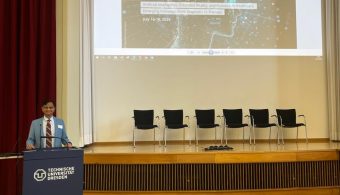Pictures’ Credit: TheDialog
In a major move toward renewable energy innovation, India is set to adopt vertical solar farm technology that will simultaneously generate clean energy and support agriculture.
The development follows the signing of a Memorandum of Understanding (MoU) on 19 September between Yashika Energy Systems, Next2Sun Germany, and Wattkraft India at the RE-INVEST 2024 summit.
Dual-Use Solar Farms: A Game-Changer for Energy and Agriculture
The collaboration aims to introduce vertical bifacial solar panels across India, allowing for dual land use. This unique technology enables farmers to continue agricultural activities while generating renewable energy.
“This partnership addresses concerns over land usage in conventional solar installations, which often displace valuable agricultural land,” explained Yash Kishorkumar Gupta, of Yashika Energy Systems.
Gupta emphasized the significance of this initiative: “By implementing Next2Sun’s vertical bifacial Agri-PV systems, we will enable dual land use—allowing farmers to continue agricultural activities while also generating renewable energy. With the support of governments and agricultural associations in both India and Germany, our goal is to launch pilot projects across India, with plans to scale this sustainable technology for nationwide adoption.”
Pilot Projects to Showcase Vertical Solar Technology
The pilot projects, with capacities ranging from 100 kWp to 500 kWp, will be launched across various regions in India. These will not only demonstrate the effectiveness of combining solar energy production with crop cultivation but will also provide a sustainable model for future large-scale implementation.
This collaboration is poised to address one of India’s biggest challenges—balancing its growing energy needs with its agricultural priorities. Traditional solar farms require large tracts of land, often at the cost of agriculture. However, the new vertical solar panels will be installed in such a way that farmers can continue to grow crops underneath them, maximizing land use and benefits.
Key Figures Witness Landmark Agreement
The signing of the MoU was attended by key dignitaries, including Sascha Krause-Tünker, CFO of Next2Sun AG, alongside Svenja Schulze, Germany’s Federal Minister for Economic Cooperation and Development, and India’s Minister of New and Renewable Energy, Shri Pralhad Joshi. Their presence underscores the importance of this agreement in strengthening India-Germany ties in the renewable energy space.
“With the support of both governments and the agricultural community, we are confident that these projects will set a new benchmark for sustainable development in India,” said Sascha Krause-Tünker. He highlighted the potential for this technology to inspire widespread adoption of similar solutions across the country.
A Sustainable Future for India’s Farmers and Energy Sector
India is uniquely positioned to lead the way in combining agriculture and renewable energy. The vertical solar farms will help meet the country’s renewable energy targets while enhancing agricultural productivity. This partnership marks a step toward India’s energy independence and underscores the nation’s commitment to global climate action.
As pilot projects roll out, they will offer real-world examples of how cutting-edge technology can change both energy production and farming practices, benefitting rural communities and setting the stage for broader adoption across India.





